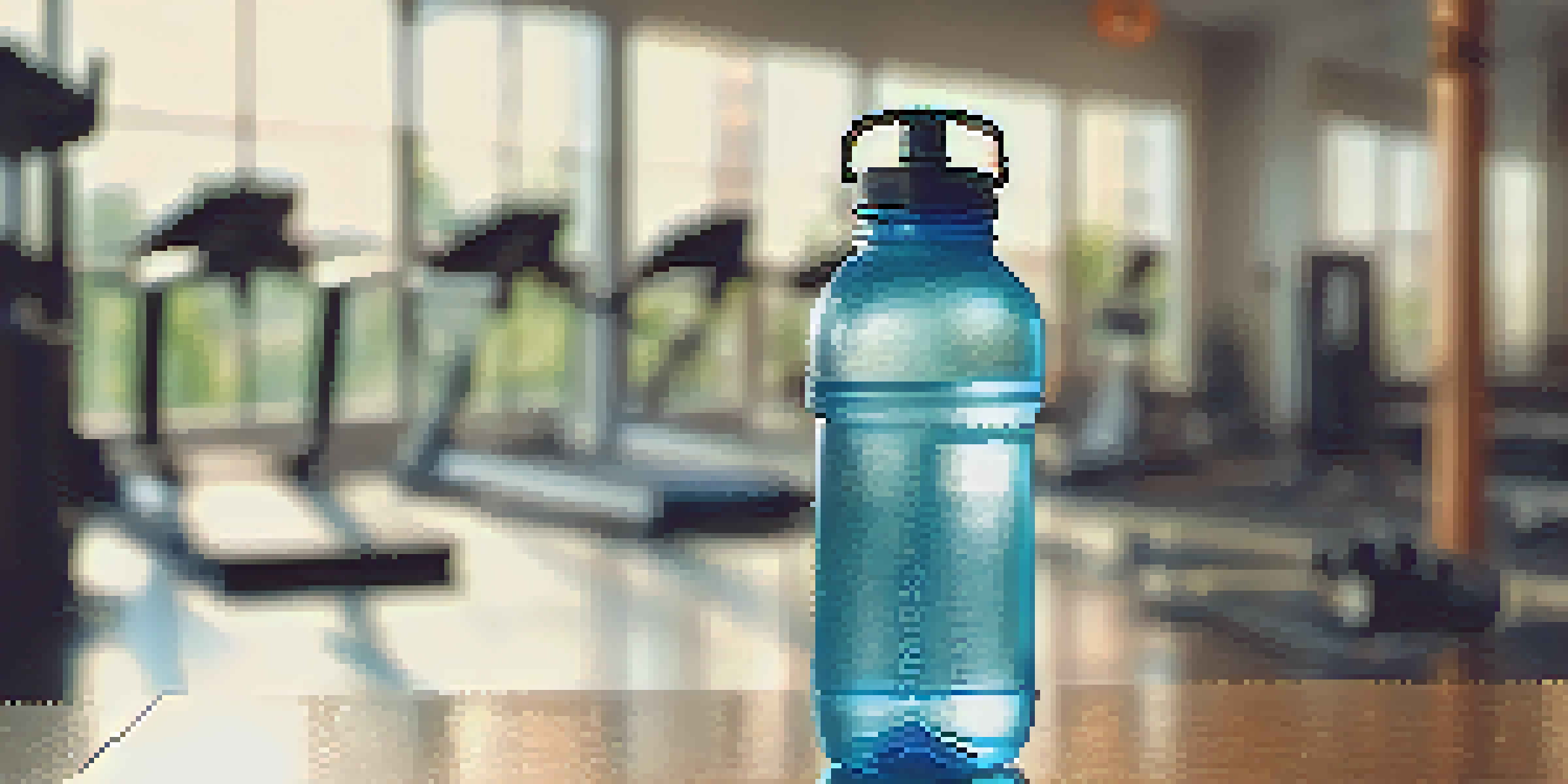The Role of Hydration in Preventing Workout Injuries

Understanding the Importance of Hydration
Hydration is a crucial component of any fitness routine, yet it often gets overlooked. When you’re working out, your body loses water through sweat, which is necessary for temperature regulation and performance. Even mild dehydration can lead to fatigue, decreased coordination, and increased risk of injury, making it essential to recognize its importance.
Water is the driving force of all nature.
Think of hydration as the oil in a well-running machine; without it, components can wear down or break. When you're well-hydrated, your muscles and joints function optimally, allowing you to perform movements with ease and efficiency. On the flip side, when hydration levels dip, the risk of injury during physical activity rises significantly.
Incorporating a hydration strategy into your workout routine is vital for both performance and safety. This means not only drinking water before and during exercise but also replenishing fluids afterward. By prioritizing hydration, you set yourself up for success in your fitness journey.
How Dehydration Affects Muscle Function
Dehydration can have a profound effect on muscle function, leading to cramps and strains. When you’re not adequately hydrated, your muscles lose essential electrolytes like sodium and potassium, which are crucial for muscle contractions. This imbalance can result in painful cramps that can cut your workout short.

Imagine trying to drive a car without enough oil; it may run for a bit, but eventually, it will sputter and fail. Similarly, dehydrated muscles can become fatigued and weak, making them more susceptible to injuries. The more intense your workout, the more hydration you’ll need to maintain proper muscle function.
Hydration Boosts Workout Performance
Staying well-hydrated enhances muscle function and reduces the risk of injury during physical activities.
To combat this, pay attention to your hydration levels, especially during strenuous activities. Drinking water or electrolyte drinks can help maintain that fine balance, ensuring your muscles stay healthy and strong throughout your workout.
Hydration and Joint Health
Hydration plays a pivotal role in joint health, acting as a lubricant to help joints move smoothly. When your body is dehydrated, the synovial fluid in your joints can decrease, leading to friction and discomfort. Over time, this can increase the risk of injuries such as sprains or strains.
Hydration is key to performance, recovery, and overall health.
Consider your joints like hinges in a door; without enough lubrication, they can become stiff and squeaky. Staying well-hydrated keeps that synovial fluid at optimal levels, allowing for better mobility and reducing wear and tear on your joints. This is especially important during high-impact activities like running or jumping.
Incorporating hydration into your routine not only enhances performance but also protects your joints from injury. Keeping a water bottle handy or setting reminders to drink can help you stay on track.
Signs of Dehydration to Watch For
Being aware of the signs of dehydration is essential for preventing workout injuries. Common symptoms include dry mouth, fatigue, dizziness, and dark-colored urine. If you notice these signs, it's crucial to act quickly by hydrating to avoid compromising your performance.
Think of your body as a dashboard; warning lights indicate when something's off. Dry mouth and fatigue are similar warning signs that tell you it's time to rehydrate. Ignoring these signals can lead to more severe consequences, such as heat exhaustion or injury during your workout.
Dehydration Signals to Recognize
Being aware of signs like dry mouth and fatigue can help you act quickly to rehydrate and maintain your performance.
Make it a habit to check in with your body before, during, and after workouts. This awareness can help you stay hydrated and injury-free, enabling you to enjoy your fitness journey to the fullest.
Hydration Strategies for Effective Workouts
Developing effective hydration strategies can significantly enhance your workout performance. Aim to drink water regularly throughout the day, not just during exercise. A good rule of thumb is to consume about 16-20 ounces of water two hours before working out and to sip water during your session.
Consider incorporating electrolyte drinks if you engage in prolonged or intense workouts, as they can replenish lost minerals. Picture your hydration strategy as a game plan; having clear guidelines can help you stay on track and prevent dehydration-related injuries.
Remember, everyone’s hydration needs are different, depending on factors like age, weight, and activity level. Experiment with what works for you, and don’t hesitate to adjust your strategy as needed.
The Role of Nutrition in Hydration
Nutrition plays an integral role in hydration, as many foods contribute to your overall fluid intake. Fruits and vegetables, like watermelon and cucumbers, contain high water content and can help keep you hydrated. Incorporating these into your diet can support your hydration goals, especially on days when you might forget to drink enough water.
Consider your daily meals as part of your hydration toolkit. Eating a balanced diet that includes a variety of hydrating foods can complement your water intake, ensuring your body has the resources it needs. It’s like adding fuel to a fire; the more you provide, the stronger it burns.
Nutrition Supports Hydration Goals
Incorporating hydrating foods like fruits and vegetables into your diet complements your water intake for optimal hydration.
Additionally, be mindful of foods that can dehydrate you, such as those high in sugar or caffeine. Balancing your meals with hydrating options can help you maintain optimal hydration levels and reduce the risk of workout injuries.
Conclusion: Make Hydration a Priority
In conclusion, prioritizing hydration is essential for preventing workout injuries and enhancing performance. From muscle function to joint health, staying adequately hydrated can significantly impact your overall fitness experience. It's not just about drinking water; it’s about understanding how hydration influences every aspect of your workouts.
Reflect on your current hydration habits and consider how they align with your fitness goals. Just as you wouldn’t skip stretching before a workout, don’t overlook the importance of hydration. Making a conscious effort to stay hydrated can lead to better workouts and fewer injuries.

So, grab that water bottle, pay attention to your body, and enjoy the benefits of hydration. Your body will thank you, and you'll be well on your way to achieving your fitness goals injury-free.